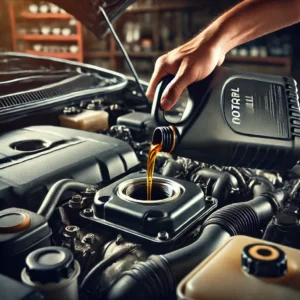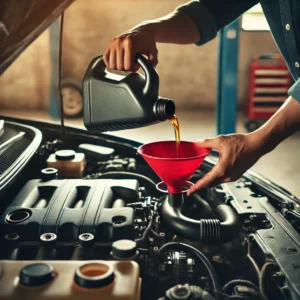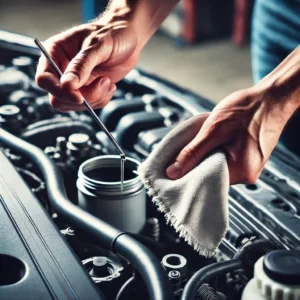Proper engine oil maintenance is key to keeping your vehicle running smoothly and avoiding costly auto repairs. Engine oil lubricates the moving parts, reducing friction and preventing excessive wear and tear. If you neglect to keep the oil at the right level, you risk serious damage that could lead to expensive repairs or even total engine failure.

In this guide, we’ll help you identify the signs and symptoms of low engine oil, so you can take action before it’s too late. Knowing these symptoms, like unusual engine noises, overheating, or warning lights on your dashboard, can save you from major headaches down the road. We’ll also cover simple steps you can take to maintain your oil level and keep your engine in top shape, ensuring you avoid unexpected auto repairs and keep your vehicle performing its best.

What is Engine Oil and Its Role
Engine oil is a lubricant composed of base oils and additives designed to protect and enhance the performance of your vehicle’s engine. Its primary functions include:
Lubrication
Engine oil creates a thin film between moving parts, reducing friction and minimizing wear. Proper lubrication prevents damage and keeps your engine running smoothly, avoiding costly auto repairs.
Cooling
As engine oil circulates, it absorbs and dissipates heat generated by the combustion process. This prevents overheating and maintains optimal engine temperature, helping you avoid unexpected breakdowns.
Cleaning
Additives in engine oil remove contaminants, sludge, and combustion byproducts. Keeping your engine oil fresh ensures your engine stays clean and runs efficiently, reducing the need for extensive auto repairs.
Protection
Engine oil protects against corrosion and oxidation, extending the lifespan of engine components. Regular oil changes provide a protective barrier, keeping your engine reliable and efficient for years to come, and saving you from costly repairs.
Effects of Low-Engine Oil
Operating your vehicle with low engine oil levels can have severe consequences, including:
Increased Friction and Wear
Insufficient oil causes metal-to-metal contact within the engine, leading to accelerated wear on critical components like pistons, bearings, and cylinder walls. This wear can severely damage your engine and reduce its overall efficiency, making regular oil checks essential for the best auto repair & maintenance.
Overheating
A lack of oil reduces the engine’s ability to dissipate heat effectively, which can cause internal components to warp or seize. This overheating can lead to significant damage, potentially requiring extensive and costly repairs. Keeping your oil levels adequate helps maintain proper engine temperature and prevents such issues.
Sludge Buildup
Inadequate oil flow can result in sludge accumulation within the engine. This sludge clogs oil passages and restricts proper lubrication, which can hinder engine performance and cause further damage. Regular oil changes help prevent sludge buildup and keep your engine running smoothly.
Reduced Fuel Efficiency
Low oil levels increase friction within the engine, which can negatively impact your vehicle’s fuel economy. Ensuring your engine is properly lubricated helps maintain optimal fuel efficiency and reduces the frequency of fuel stops, saving you money in the long run.
Premature Engine Failure
Prolonged operations with low oil levels can ultimately lead to complete engine failure. This catastrophic failure necessitates costly repairs or even a full engine replacement. Regular maintenance and oil checks are vital to avoid such severe consequences and keep your vehicle running efficiently.
Signs and Symptoms of Low Engine Oil
Recognizing the signs and symptoms of low engine oil is crucial for preventing further damage to your vehicle’s engine. Here are some typical signs to be aware of:
Low Oil Pressure Warning Light
Most modern vehicles have an oil pressure warning light on the dashboard. This light comes on when the oil pressure falls below a safe level. If you see this light come on, it’s a clear sign that your engine might not be getting the oil it needs to run smoothly.
Abnormal Engine Noises
If your oil level is low, you might hear unusual sounds coming from your engine. These noises could include knocking, tapping, or grinding. This happens because the oil is not providing enough lubrication, leading to increased friction between the engine’s moving parts.
Excessive Exhaust Smoke
Low oil levels can lead to more combustion byproducts, which can make your car produce visible blue or gray smoke from the exhaust pipe. This smoke is a sign that your engine is burning oil, which is not a good sign and should be checked out immediately.

Burning Oil Smell
A distinct burning smell might be present if your car’s oil is overheating or burning due to insufficient lubrication. This odor is often strong and unmistakable, indicating that your engine is struggling to stay lubricated.
Engine Overheating
Without adequate oil flow, your engine’s cooling system may struggle to dissipate heat effectively. This can cause the engine to overheat, potentially leading to serious damage if not addressed quickly. Always ensure your oil level is sufficient to keep your engine running at the right temperature.
Engine Issues Caused by Low Engine Oil
Low engine oil levels can significantly impact your vehicle’s performance, leading to various issues, including:
Loss of Power and Acceleration
When there is increased friction and heat in the engine, it can reduce the engine’s efficiency. This often results in a noticeable loss of power and sluggish acceleration. You might find that your car doesn’t respond as quickly or as powerfully as it usually does.
Rough Idling and Stalling
Insufficient lubrication in the engine can cause irregular combustion. This can lead to rough idling, where your car shakes or vibrates when it’s just sitting in place. In severe cases, this lack of lubrication can even cause the engine to stall unexpectedly.
Poor Fuel Economy
Low oil levels can lead to increased friction and inefficient combustion, which negatively impacts your car’s fuel efficiency. You might notice that you’re needing to fill up your gas tank more often than usual, which can be a clear sign of poor fuel economy.
Decreased Responsiveness
Low oil pressure can affect the smooth operation of hydraulic components in your engine, like the variable valve timing systems. When these systems don’t work properly, it can result in reduced engine responsiveness. Your car might not accelerate as smoothly or react as quickly to your inputs.
Engine Damage from Low Oil
Prolonged operation with low engine oil levels can lead to severe and potentially irreversible damage to various engine components, including:
Bearing Failure
Without proper lubrication, bearings in the engine can seize or spin. This can lead to catastrophic engine failure, meaning your engine could stop working entirely, requiring extensive and expensive repairs.
Cylinder and Piston Damage
Insufficient oil can cause excessive wear on the cylinder walls and pistons. This wear can result in scoring, scuffing, or even seizure of these components, making your engine less efficient and possibly causing it to fail.
Camshaft and Valve Train Damage
Lack of lubrication can lead to increased wear on the camshafts, lifters, and other parts of the valve train. Over time, this can cause significant damage, leading to costly repairs to restore your engine’s performance.
Engine Overheating and Warping
When there’s inadequate oil flow, your engine can overheat. This overheating can warp or crack critical components like the cylinder heads or engine blocks. Such damage is often severe and can be very expensive to fix.
Sludge Buildup and Clogged Oil Passages
Low oil levels can contribute to the formation of sludge in your engine. This sludge can clog oil passages, restricting proper lubrication and causing further damage to your engine over time. Regular maintenance and checking oil levels can help prevent this issue.
How to Check the Engine Oil Level
Checking your engine’s oil level is a simple yet crucial task that should be performed regularly. Here’s how to do it:
Park on a Level Surface
Make sure your vehicle is parked on an even, flat surface. This is important to get an accurate reading of your oil level. If the car is on a slope, the oil may shift, giving you an incorrect reading.
Allow the Engine to Cool
It’s recommended to check the oil level when the engine is cool. Hot oil can give an inaccurate reading, so let your car sit for a while after driving before you check the oil.
Locate the Dipstick
Refer to your owner’s manual to find the dipstick. It’s usually situated near the engine and often has a brightly colored handle for easy identification.

Pull Out the Dipstick and Wipe it Clean
Remove the dipstick from its tube and use a clean cloth or paper towel to wipe off any residual oil. This guarantees you receive an accurate reading.
Reinsert the Dipstick and Remove it Again
After wiping it clean, fully reinsert the dipstick back into its tube. After that, pull it out again to check the oil level. Make sure to push it all the way in to get an accurate measurement.
Check the Oil Level
Look at the markings on the dipstick. The oil level should lie between the minimum and maximum markers. If it’s below the minimum mark, you’ll need to add more oil to bring it up to the proper level.
Steps to Take if You Have Low Engine Oil
If you’ve identified that your engine oil level is low, it’s crucial to take immediate action to prevent further damage. Here are the steps to follow:|
Top Up the Oil
When topping up the oil, add the recommended type and quantity specified in your owner’s manual. Pour slowly and check the level frequently to avoid overfilling, as too much oil can cause problems for your engine.
Check for Leaks
Inspect the engine bay and the area beneath your vehicle for any signs of oil leaks. Check for oil spots or puddles on the ground. If you notice a leak, it’s important to have it addressed by a professional mechanic promptly to prevent further damage.
Monitor the Oil Level
After adding oil, keep an eye on the level and check it regularly. If you notice that the oil level continues to drop rapidly, there might be a more serious issue that needs to be addressed. Consistent monitoring helps ensure your engine stays properly lubricated.
Seek Professional Assistance
If you’re unsure about the cause of the low oil level or if the problem persists, it’s best to have your vehicle inspected by a qualified mechanic. They can identify and address any potential issues to keep your engine running smoothly.
Preventive Measures to Avoid Low-Engine Oil
To minimize the risk of low engine oil levels and the associated problems, it’s essential to follow these preventive measures:
Regular oil changes
Follow the recommended oil change intervals specified in your owner’s manual or by your trusted mechanic. Regular oil changes ensure that fresh, clean oil is circulating through your engine.
Use the recommended oil type
Always use the oil type and viscosity recommended by the vehicle manufacturer. Using the wrong oil can lead to inadequate lubrication and potential damage.
Check for leaks
Regularly inspect your vehicle for any signs of oil leaks, such as spots on the ground or stains on the engine bay. Take care of any leaks immediately to avoid further oil loss.
Monitor oil levels
Make it a habit to check your engine’s oil level regularly, even if you’ve recently had an oil change. This enables the early detection of any potential issues.
Follow proper maintenance schedules
Follow the recommended maintenance schedules provided in your owner’s manual. This includes replacing oil filters, inspecting seals and gaskets, and addressing any other potential issues that could lead to oil leaks or consumption.
Frequently Asked Questions
How often should I check my engine oil level?
It’s recommended to check your engine oil level at least once a month or before any long-distance trip. Additionally, it’s a good practice to check the oil level every time you refuel your vehicle.
Can I drive with low engine oil?
Driving with low engine oil levels is not recommended, as it can cause severe damage to your engine. If you notice low oil levels, it’s best to add the recommended oil as soon as possible and have any underlying issues addressed by a professional mechanic at Auto Repair Hurst TX.
What could happen if I neglect to change my engine oil regularly?
Neglecting to change your engine oil regularly can lead to sludge buildup, increased wear on engine components, reduced fuel efficiency, and potentially premature engine failure. Routine oil changes are essential for preserving your vehicle’s performance and extending its lifespan.
Can I mix different types of engine oils?
It’s generally not recommended to mix different types of engine oils, as they may have varying formulations and additives. Always use the oil type and viscosity specified by the vehicle manufacturer to ensure proper lubrication and protection.
How do I know if my engine has suffered damage due to low oil levels?
If you’ve been driving with low oil levels, have a professional mechanic inspect your engine for damage. They can perform diagnostic tests to check critical components like bearings, crankshaft, camshaft, and pistons. This helps determine if any repairs or replacements are needed to keep your engine running smoothly.
Conclusion
Addressing low engine oil symptoms promptly is crucial. Early recognition of signs like unusual engine noises, overheating, or warning lights can save you from costly auto repairs. Our expert team offers thorough inspections and top-notch maintenance to keep your vehicle running smoothly.
We understand your vehicle is vital to your daily life, and our skilled mechanics use the latest diagnostic tools to ensure your engine’s health. By being proactive, you can prevent unexpected breakdowns and expensive repairs.
Don’t wait until it’s too late. Trust Pit Stop Xpress for all your auto repair needs. Visit us today and keep your car performing at its best. Experience exceptional service and drive with confidence, knowing your vehicle is in capable hands.
End Note
At Pit Stop Xpress, we pride ourselves on delivering the best auto repair & maintenance services to keep your vehicle running smoothly. Recognizing low engine oil symptoms and taking prompt action can save you from costly repairs and ensure a safer driving experience.
Explore our wide range of services here and see why we are the trusted choice for many vehicle owners. Whether you need a routine oil change or a comprehensive inspection, our expert team is ready to assist you. Check out our gallery to see the high-quality work we perform and meet the dedicated professionals who make it happen by visiting our about us page.
Don’t wait until it’s too late. Visit Pit Stop Xpress today and experience the best auto repair & maintenance service around. For additional details or to book an appointment, please visit our contact page. Both you and your vehicle deserve the highest quality of care. Let Pit Stop Xpress be your go-to destination for all your auto repair needs. Feel assured on the road, knowing your car is in expert hands.


